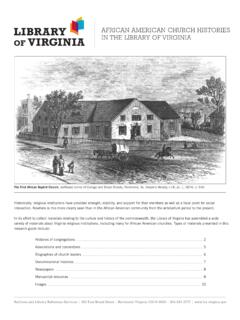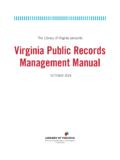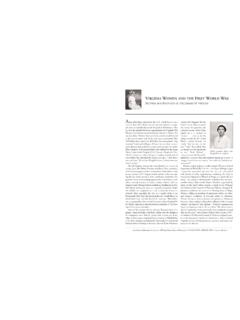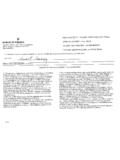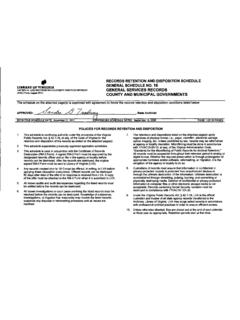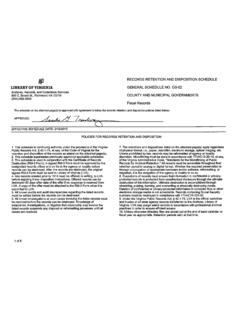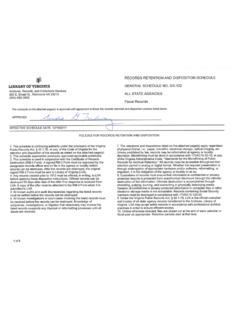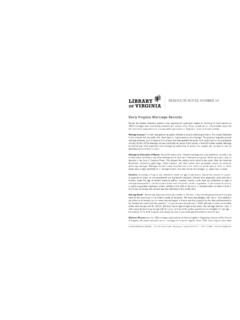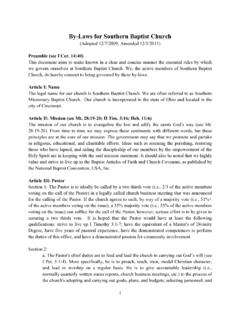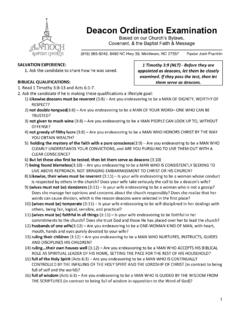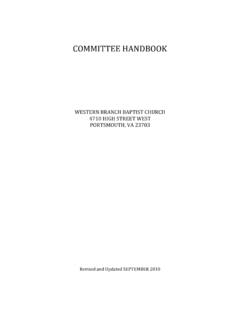Transcription of Slavery in Virginia: A Selected Bibliography
1 Slavery in virginia : A Selected BibliographyAbout the latter end of August [1619], a Dutch man of Warr of the burden of a 160 tunes arriued at Point-Comfort, the Comandor nameCapt Jope, his Pilott for the West Indies one Mr Marmaduke an Englishman. They mett wth the Trer in the West Indyes, and determyned tohold consort shipp hetherward, but in their passage lost one the other. He brought not any thing but 20. and odd Negroes, wth the Governorand Cape Marchant bought for vietualle (whereof he was in greate need as he p tended) at the best and easyest rate they could. He hadd alargge and ample Comyssion from his Excellency to range and to take purchase in the West Records of the virginia Company of London, Volume IIIOVERVIEWT hroughout much of virginia s early history until the Civil War, Slavery was a major feature of life.
2 Although the legal importing ofslaves by sea or land may have stopped in 1778, the institution of Slavery thrived in virginia . Edmund S. Morgan, in his article Slavery and Freedom: The American Paradox (Journal of American History, June, 1972), concluded that, rather than a conscious deci-sion, Slavery automatically developed because Virginians bought the cheapest labor they could get. As slaves became an increasinglylarger part of society, virginia began codifying the status of slaves in the 1600s. Commenting on this feature in Southern Slavery andthe Law, 1619 1860, Thomas D. Morris states that the origins of Southern laws on Slavery lie deep in seventeenth-century virginia .
3 Census figures show that, while slaves in other states may have composed a larger percentage of the total population, virginia alwayshad the largest total number of slaves. According to The Trans-Atlantic Slave Trade: A Database on CD-ROM, a compact disc with therecords of 27,233 trans-Atlantic slave ship voyages, 84,247 slaves disembarked in virginia between 1650 and 1775. The MacmillanEncyclopedia of World Slaverygives a figure of 950 slaves in virginia in 1660, growing to 140,470 by 1760. With Slavery playing such a prominent role, the examination of its history in the state facilitates a greater understanding of virginia spast.
4 The following is an attempt to aid in that understanding by providing a select list of data and resources, showing material aboutboth the slave trade and Figures (top five slaveholding states)Historical Census Browser from the University of virginia , Geospatial and Statistical Data Center: PopulationSlaves as % Ranking by of Total Population% Slaves1790 VIRGINIA292,627747, CAROLINA107,094249, ,036319, CAROLINA100,783395, ,26482, ,671885, CAROLINA146,151345, CAROLINA133,296478, ,635341, ,699162, ,518974, CAROLINA196,365415, CAROLINA168,824555, Reference Services 800 East Broad Street Richmond, virginia 23219-8000 804/692-3777 PopulationSlaves as % Ranking by of Total Population% Slaves1810 (cont.)
5 MARYLAND111,502380, ,218252, ,1531,065, CAROLINA251,783490, CAROLINA205,017638, ,656340, 126,732564, ,7571,211, CAROLINA315,401581, CAROLINA245,601737, ,531516, ,213687, ,0871,239, CAROLINA327,038594, ,944691, ,532590, CAROLINA245,817753, ,5281,421, CAROLINA384,984668, ,682906, ,844771, ,878606, ,8651,596, ,1981,057, ,631791, ,080964, CAROLINA402,406703, Virginians Born as Slaves Ga r r a t y, John A., and Ma rk C. Carnes, National Bi o g r a p h y. New Yo rk: Oxford Un i versity Press, 1999. E176 A472 1999 Brooks, Walter Henderson(30 August 1851 6 July 1945), clergyman, temperance leader, and poet, was born in Richmond, virginia , the son of Albert Royal Brooks and Lucy Goode, slaves.
6 In 1866, Brooks began studies at Lincoln University in Pennsylvania and, after obtaining college and theological degrees in 1873, returned to virginia . He worked as a Sunday schoolmissionary with the American baptist Publication Society and in 1877 became pastor of the Second African baptist church ofRichmond. By 1875, he was nationally known as a temperance advocate. Later, Brooks helped start the virginia Historical andLiterary Society and was a trustee of the virginia Theological Seminary and College in Lynchburg, virginia . Jasper, John(4 July 1812 30 March 1901), baptist preacher and orator, was born in Fluvanna County, virginia , the son of slave parents, Philip Jasper, a slave preacher, and Nina, head servant of the Peachy family.
7 While a slave, Jasper was an active and dynamic orator in the First African baptist church of Richmond, gaining widespread public acclaim from his The Sun Do Move sermon. Immediately after the Civil War, Jasper ran the Third baptist church of Petersburg. He then returned to Richmond, and in 1867 helped organize what was to become the Sixth Mount Zion baptist , Isaac(December 1775 c. 1850), enslaved blacksmith, was born at Monticello in virginia , the son of George, a foremanand overseer, and Ursula, a pastry cook and laundress. Jefferson s reminiscences were recorded by Charles Campbell and later published in 1951 as Memoirs of a Monticello Slave, as Dictated to Charles Campbell in the 1840 s by Isaac, One of Thomas Jefferson sSlaves.
8 Many value it as a detailed depiction of slave life in , John, Jr.(11 July 1863 3 December 1929), newspaper editor and banker, was born near Richmond, virginia , on theestate of James Lyons, where his parents, John Mitchell and Rebecca (maiden name unknown), were house slaves. As editor of theAfrican American newspaper Richmond Planetfor forty-five years, Mitchell modernized the publication and helped make it a relatively profitable company. While at the newspaper, he vigorously campaigned against racial discrimination, often ignoringdeath threats. Mitchell was also active in virginia s Republican party, serving as a member of the Richmond City Council fromJackson Ward.
9 He later turned his talents towards economic development, founding the Mechanics Savings Bank in , James Solomon(20 December 1857 28 March 1935), educator and priest, was born on the Hendrick Estate in Mecklenburg County near Palmer Springs, virginia . His father, Solomon, and his mother, Araminta (maiden name unknown),lived as slaves on adjoining properties, with the North Carolina state line between them. He attended the Bishop Payne DivinitySchool in Petersburg, virginia , and was later tutored by the Reverend Giles Buckner Cooke. In 1882, Russell became an ordaineddeacon in the Protestant Episcopal church , and an active speaker.
10 In 1888, Russell opened Saint Paul s Normal and IndustrialSchool in Lawrenceville, virginia . SLAVE TRADEG eneralDeyle, Steven. Carry Me Back: The Domestic Slave Trade in American Life. New York: Oxford University Press, 2005. E449 D525 2005 Deyle has written a study of the informal and organized commerce of trading in slaves born in America, focusing on the movement ofslaves between the Upper South and the Lower , Robert H. A Troublesome Commerce:The Transformation of the Interstate Slave Trade. Baton Rouge: Louisiana StateUniversity Press, 2003. E442 G83 2003 The author examines southerners changes in perception towards the slave trade, slave speculators, and Slavery in the late eighteenthand early nineteenth centuries.
